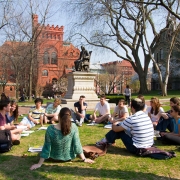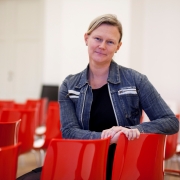Researchers Discover Which Brain Region Motivates Behavior Change
Researchers from the University of Pennsylvania, Yale University, Columbia University, and Duke University now better understand what motivates behavior change. The research points to a region in the brain called the posterior cingulate cortex. Neurons in this central location ramp up firing rates, peaking just before a divergent behavior occurs. The team published their findings in the journal Neuron.
“The circuits in our brain that allow us to focus on a particular task, especially a task that leads to reward, are well known,” says Michael Platt, James S. Riepe University Professor . “These evolved very early in the history of life on this planet.”
What’s less established is which trigger in the brain causes people to break from a routine, especially when doing so poses potential risks.Two experiments the research team conducted—one called the patch-leaving task, the other dubbed the traveling salesman—provided some important insights.
In the first, Platt and colleagues looked at the foraging behaviors of rhesus macaques, a non-human primate species the researchers have studied both in the lab and in the wild. The animals had the choice between harvesting a juice reward that depleted over time but was guaranteed and immediate or moving to a new “patch,” which would require more time and energy but offered a potentially larger reward.
“Imagine you’re picking berries in a tree,” he says. “At first it’s easy, but after a while you have to climb farther and farther out on weaker branches to get the berries, most of which probably aren’t ripe. At some point it makes sense to take the time and energy to go to the next tree.”
Click here to read the full story.





